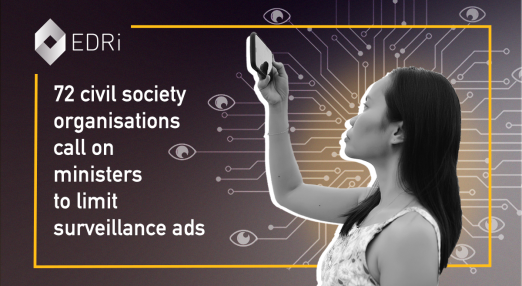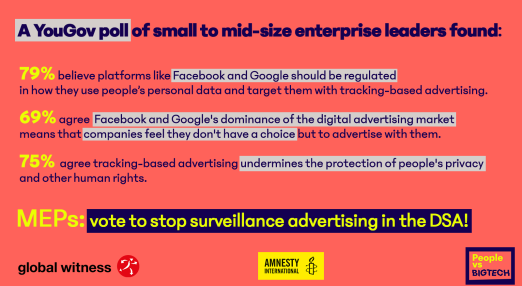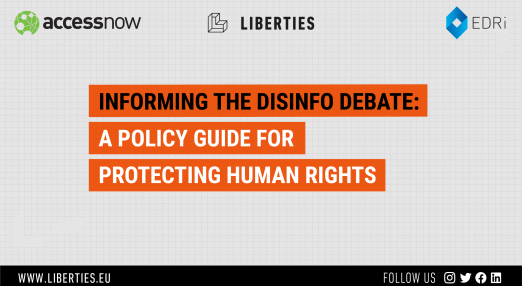EU negotiators approve good DSA, but more work is needed to build a better internet
Friday night’s political agreement on the Digital Services Act (DSA) is a good first step towards protecting people’s rights on the internet and to some extent limiting the immense power that Big Tech companies have over people and democracies.
Filter resources
-

EU negotiators approve good DSA, but more work is needed to build a better internet
Friday night’s political agreement on the Digital Services Act (DSA) is a good first step towards protecting people’s rights on the internet and to some extent limiting the immense power that Big Tech companies have over people and democracies.
Read more
-

A new crisis response mechanism for the DSA
EDRi is one of 38 civil society organisations jointly raising our voices to the DSA negotiators to stop negotiating outside their respective mandates and respect the democratic process of the EU. We demand concrete improvements necessary for the Crisis Response Mechanism (CRM) to respect international human rights law and prevent the future abuse of those emergency powers. Add your voice now!
Read more
-

France must not betray European citizens on the DSA at the 11th hour
As civil society, we welcomed Minister Cedric O’s commitment on Friday to prohibit targeted advertising to minors as well as the use of sensitive data for ad targeting in the DSA. Now the French Council Presidency must follow through and protect citizens, 35 NGOs write in an open letter.
Read more
-

Open Letter: Abolish manipulative dark patterns and creepy online ads, ask 72 civil society organisations
Ahead of the upcoming Digital Services Act (DSA) trilogue meeting on 15 March, EDRi, Liberties and Amnesty International and 69 other civil society organisations have sent a joint open letter to 20 ministers and state secretaries in 9 EU Member States. On Tuesday 1.03.2022, several organisations in the Netherlands, Denmark, Germany, France, Spain, Italy, Luxembourg, Austria, Croatia delivered the letter to relevant decisionmakers responsible for their country's position in the EU negotiations.
Read more
-

The EU Parliament takes strong stance against surveillance ads
The Platform Power campaign, alongside many civil society organisations, raised its voice for stronger laws against the business model of Big Tech online platforms and succesfully pressured law-makers to put people at the center of the debate.
Read more
-

Framing the future of the internet
The European Parliament has just voted on the Digital Services Act, crucial for internet regulation.
Read more
-

European Parliament approves rights-respecting DSA & proposes ban on use of sensitive personal data for online ads
Today's upcoming vote by the European Parliament's (EP) on the Digital Services Act (DSA) is expected to be a good step forward in protecting people’s rights on the internet, including freedom of expression and information, right to safety and the right to privacy, which EDRi has strongly and consistently advocated for.
Read more
-

People ask MEPs: Take the opportunity, end surveillance ads!
Thousands of people are asking the EU Parliament to end online surveillance advertising , ahead of the DSA (Digital Services Act) vote in the plenary on Thursday, 20 January 2022. EDRi is part of the movement mobilising people, together with individual organisations in the PeopleVsBigTech group and beyond.
Read more
-

Hide and Seek: Polish DPA agrees that people should be able to access their advertising profiles, but there’s no way to do so
Following EDRi member Panoptykon’s General Data Protection Regulation (GDPR) complaint against one of the biggest Polish news website, Interia.pl - the Polish Data Protection Authority has confirmed that online publishers should give users access to their advertising profiles generated for the purposes of delivering behavioural ads.
Read more
-

Don’t let Big Tech fool you: Small businesses don’t want surveillance advertising
Tracking-based advertising has become all pervasive in the digital world. Amnesty Tech's new research shows that small businesses know very well how harmful these practices are to human rights but have little alternative.
Read more
-

2022: Important consultations for your Digital Rights!
Public consultations are an opportunity to influence future legislation at an early stage, in the European Union and beyond. They are your opportunity to help shaping a brighter future for digital rights, such as your right to a private life, data protection, or your freedom of opinion and expression.
Read more
-

Booklet: Informing the disinfo debate
Today, 20 December 2021, EDRi, Access Now and Civil Liberties Union for Europe publish a joint report as a continuation of its 2018 predecessor, Informing the “Disinformation” Debate. The main outcome of this report is a set of policy recommendations addressed to the EU co-legislators focusing on: how to effectively mitigate fundamental rights risks that result from the manipulative methods deployed by large online platforms that exploit people’s vulnerabilities and their sensitive data; and how to combat disinformation in a manner that is fully compliant with fundamental rights standards.
Read more
